Petition Against Chaining Dogs Signed by More Than 40,000 People
ZAGREB, 9 March, 2021 - The Friends of Animals association said on Tuesday that its petition, launched to ban chaining dogs, had so far been signed by more than 40,000 people and that its initiative had also been supported by associations of veterinarians.
The NGO said that it had sent a letter to the government calling on it to urgently amend the Animal Welfare Act and that it expected a positive response.
It said that its initiative had been supported by the most important veterinarian associations, including the Croatian Veterinary Chamber.
In a letter of support for the campaign, Croatian Veterinary Chamber head Ivan Zemljak says the campaign will contribute to raising the standards of animal protection and welfare in Croatia.
Veterinarian Tatjana Zajec has said that dogs are social animals so their long-term confinement or chaining can cause serious damage to their physical or psychological well-being.
Dogs that are chained lack sufficient play and activity, are not taught to happily co-exist with other animals and humans and are therefore frequently dangerous for everyone around them, veterinarians warn.
For more news about Croatia, follow TCN's dedicated page.
Firefighter Whose Petrinja Rescue Dog Was Poisoned Given New Puppy
January 26, 2021 – Firefighter Srđan Botica from Slano near Dubrovnik was inconsolable after his hero Petrinja rescue dog Alice was poisoned a few days ago. Although irreplaceable, Srđan's friends could no longer stand by and watch him grieve undeservedly, so they bought a brand new Belgian Shepherd puppy to cheer him up
Srđan Botica was inconsolable after the death of his dog, Alice. Although she was still quite young, Alice and Srđan had built a strong bond between them. The training required for a dog like Alice to become a specialist search and rescue dog will have that kind of effect. The relationship Srđan established with Alice was strengthened both in his workplace, where Srđan is a firefighter and at home, which is where Srđan brought Alice each evening.
The final test of the pair's attachment was to be the rubble left in the aftermath of the Sisak Moslavina earthquake. Srđan volunteered to travel from Dubrovnik to help in the response. Alice became a Petrinja rescue dog, scouring the damaged and fallen buildings for survivors. The inseparable pair stayed for six days undertaking their work.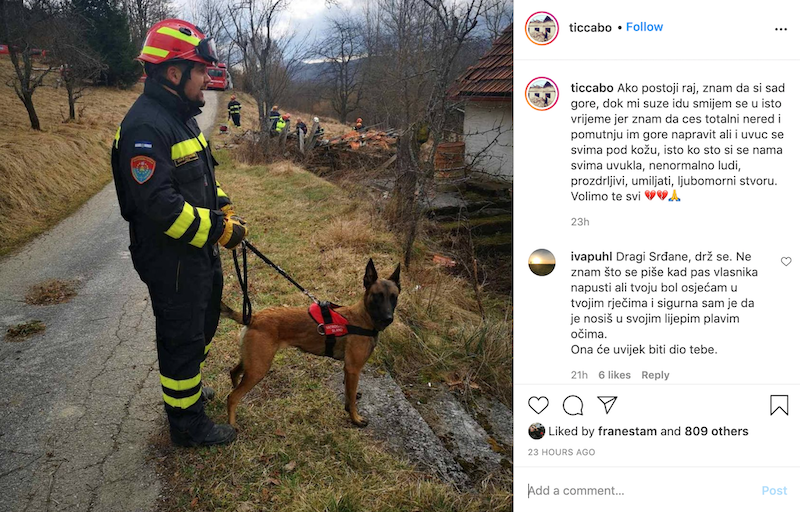 Srdan and Alice at work after the earthquake
Srdan and Alice at work after the earthquake
As TCN was saddened to report over recent days, the partnership of Srđan Botic and his Petrinja rescue dog Alice was tragically cut short within weeks of their return. Alice was poisoned on the streets of her home in Slano, near Dubrovnik.
Though Petrinja rescue dog Alice was one of a kind and can never be replaced, the friends of firefighter Srđan Botica could no longer sit by and watch his undeserved grief. Over the last couple of days they clubbed together and bought Srđan a new dog. Srđan's new housemate goes by the name of Amy and she's still just a puppy. Amy is a Belgian Shepherd, the exact same breed as Petrinja rescue dog Alice.
It is probably still too early to say whether Amy will follow in Alice's pawsteps to become a search and rescue dog. But, Belgian Shepherds are one of the best-known breeds for this kind of work. They are used as search and rescue dogs by firefighters and mountain rescue in many countries, and as police and military dogs. They have a good reputation as sniffer dogs, particularly in the field of finding illegal drugs. Several Belgian Shepherds have been decorated for bravery and they are very protective of their owners and handlers.
The US Secret Service, Israel Defence Forces, Indian NSG commando unit and Royal Australian Air Force use Belgian Shepherds in their work. The breed is second in number only to the German Shepherd for use across the whole of the US Armed Forces.
Oldest Domesticated Dogs In Croatia From 7500 Years Ago
November 3, 2020 - Croatia is well known as a dog-loving country, but just how long have there been domesticated dogs in Croatia? The oldest evidence is 7500 - 8000 years old
A new study published in the scientific journal Science ‘Origins and genetic legacy of prehistoric dogs’ has revealed fascinating details about the history of dogs, their origins and their co-existence with man. Lead by scientists from the University of Oxford, the Francis Crick Institute and the University of Vienna, four experts on Dogs in Croatia also participated: Dr. Sc. Dragana Rajković (Archaeological Museum, Osijek), Ph.D. Daria Ložnjak Dizdar (Institute of Archaeology Zagreb), Ph.D. Maja Pasarić (Institute of Ethnology and Folklore Research, Zagreb) and Dr. Sc. Mario Novak (Institute of Anthropology, Zagreb).
The study shows that around 11,000 years ago, at least five major historical dog breeds were separated and dispersed around the world. These breeds were all descended from a now-extinct species of wolf that was alive during the last ice age. These five dog breeds are the forefathers of today's domesticated dogs in Croatia, and everywhere else.
In an interview with Vecernji List, Dr Mario Novak explained some of the study's findings. He said that canines in Europe from the Mesolithic and Neolithic periods, including dogs in Croatia, appear to originate from two very different populations, one associated with Middle Eastern dogs and the other with Siberian dogs. Research has shown that over the last 10,000 years these early breeds have mixed and created the dogs as we know them today. The archaeological site where evidence of the oldest domesticated dogs in Croatia was found is directly to the east of the modern city. You pass by the area of this former Neolithic settlement when you travel between the city and Zadar airport © Wikipedia
The archaeological site where evidence of the oldest domesticated dogs in Croatia was found is directly to the east of the modern city. You pass by the area of this former Neolithic settlement when you travel between the city and Zadar airport © Wikipedia
In their current forms, today's humans have existed for more than 40,000 years and dogs for about 14,500 years. The oldest evidence of modern domesticated dogs in Croatia come from remains found near Zadar. They have been dated to between 7500 and 8000 years old. There are six breeds of dogs that are today recognised as being indigenous to Croatia - Croatian sheepdog, Dalmatian, Istrian Coarse-haired Hound, Istrian Shorthaired Hound, Posavac Hound and the Tornjak. The vast majority of modern dog breeds originated over the last 200 years, so it is not clear if the oldest remains of dogs in Croatia are related to the indigenous breeds of today's dogs in Croatia.
“The question of why man and dog decided to coexist together is still not fully explained,” said Dr Novak to Vecernji List. “The relationship between man and dog is a very complex issue - this relationship is not one-way and most likely arose for mutual benefit, i.e. people realized the benefit they get from dogs and vice versa. The process most likely began about 25,000 years ago, and according to archaeological evidence, the process could have been completed approximately 14,500 years ago.”
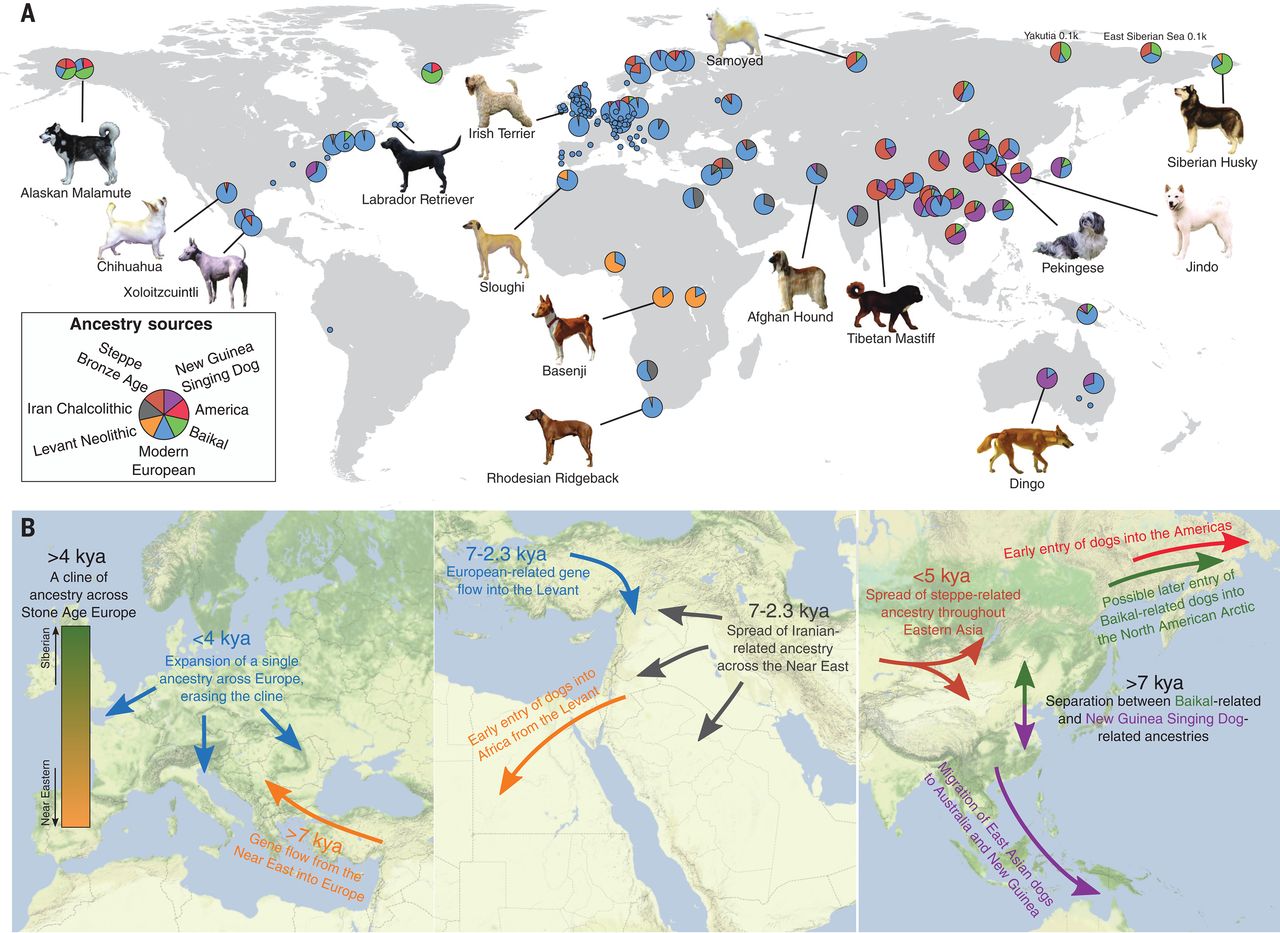 Graphic explaining ancestry of global dogs today, from the study
Graphic explaining ancestry of global dogs today, from the study
Dr Novak stated that the oldest evidence of modern domesticated dogs in Croatia comes from remains found in the Early Neolithic layer of the Crno vrilo archaeological site near Zadar. A fragment of the dog's lower jaw and two teeth from this site were dated to be approximately 7500-8000 years old. The ancient genomes of dogs in Croatia were sequenced for the first time in the Science journal study. One is from the Aljmaš - Podunavlje archaeological site, a Copper Age settlement (around 2600-2400 BC), the other from the site Sotin - Srednjea field, an older Copper Age settlement (around 3000-2900 BC).
For the latest travel info, bookmark our main travel info article, which is updated daily.
Read the Croatian Travel Update in your language - now available in 24 languages
Firefighters Malinois Belgian Shepherd Sniffs Out Wanted Man in Split
Saturday, 5 September 2020 – More than 100 policemen were searching for the escaped man, but in the end it was a firefighters Malinois Belgian Shepherd that sniffed him out.
When detainee Branimir Čaleta managed to escape from custody on September 2, armed police were immediately on his tail. They knew where to look – he was seen running in the direction of Turska kula and the Park Mladosti in Split, near the Poljud football stadium.
But, though more than 100 officers were searching for the wanted man, in the end, it was a firefighters Malinois Belgian Shepherd called Flip that sniffed him out.
The Malinois Belgian Shepherd is used by armed services, the police and for search and rescue all over the world © TC Perch
Details of Flip's assistance were revealed in an interview undertaken with the dog's handler, Split firefighter Joško Čule by the 24 sata news outlet. Although he was not allowed to reveal details of the fugitive's capture, Joško did speak about his dog.
Flip is a search dog of the Public Fire Brigade of the City of Split, a firefighters Malinois Belgian Shepherd. He was trained to search in all environments, from urban areas and ruins to wild nature, and in all weather conditions. He is a family dog, loves spending time with children, and with the firefighters. He is an active member of the firefighting team in Split and works every day. Flip is taken into the field when necessary and has so far participated in four searches for lost people. He found them all.
This firefighters Malinois Belgian Shepherd is just one of the types of Belgian Shepherd. The other three are called Groenendael, Laekenois, and Tervuren. In Belgium, their country of origin, all four types are considered to be varieties of a single breed, differentiated by hair color and texture. Elsewhere, they are sometimes considered separate breeds.
Flip, the firefighters Malinois Belgian Shepherd is typical in having tan to brown short hair with patches of black. Belgian Shepherd Dogs are highly intelligent, alert, and sensitive to everything going on around them, and they form very strong relationship bonds. They are loyal, intelligent, fun, make good family pets and are very receptive to being trained, thus explaining the position of this firefighters Malinois Belgian Shepherd.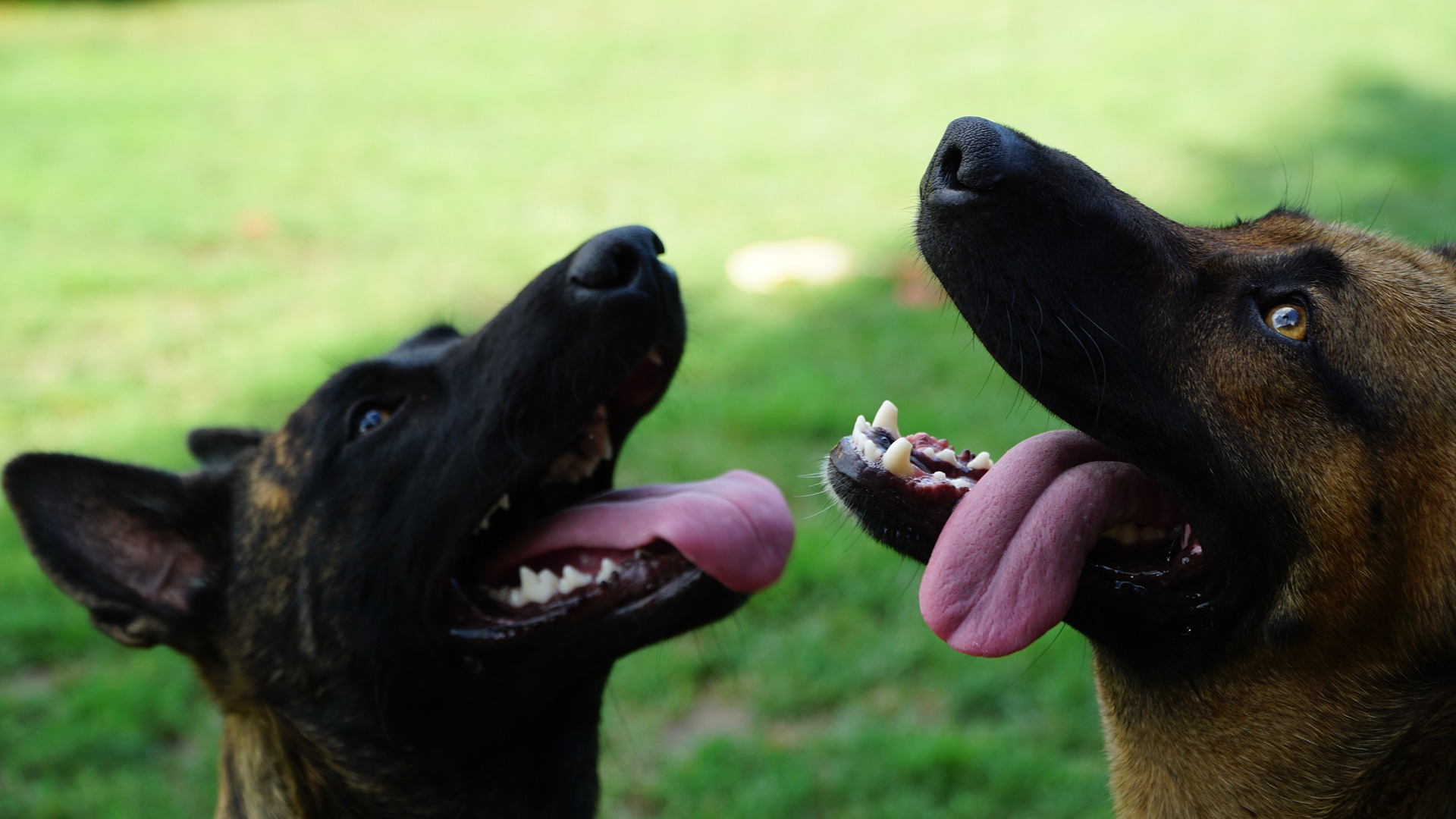
A Belgian Shepherd with a close relative, a Dutch Shepherd © Marius Zopole
It is not only firefighters who use these dogs. They are used as search and rescue dogs by other services and as police and military dogs. They have a good reputation as sniffer dogs, particularly in the field of finding illegal drugs. Several Malinois Belgian Shepherds have been decorated for bravery. They are very protective of their owners and handlers.
The US Secret Service, Israel Defense Forces, Indian NSG commando unit and Royal Australian Air Force use Malinois Belgian Shepherds in their work. The breed is second in number only to the German Shepherd for use across the whole of the US Armed Forces.
The fugitive Branimir Čaleta ran away from police while he was at court in Split, where he was appearing charged with the murder of his one-time girlfriend, a Ukrainian national. Čaleta is now back in custody, thanks to Flip, the firefighters Malinois Belgian Shepherd.
For the latest travel info, bookmark our main travel info article, which is updated daily.
Read the Croatian Travel Update in your language - now available in 24 languages
Zagreb Children's Hospital Gets Therapy Dog
September 3, 2020 – A Zagreb Children's Hospital is preparing to welcome its first canine member of staff – Jupi, a border collie
They are often said to be the most intelligent of all dogs. Used traditionally for herding livestock, border collies can learn a very large number of signals and commands. They are eminently trainable. Now, that intelligence is to be applied to the area of therapy, as one Zagreb children's hospital prepares to welcome its first border collie as a member of the team.
Still only a puppy, Jupi is being prepared for the role by her owner, Iva Zečević, a clinical psychologist at the Psychiatric Hospital for Children and Adolescents. At the moment, Jupi still needs to get her jabs, go for training and pass a therapy dog exam, Iva revealed to Jutarnji List journalist Lada Novak Starčević in a recent interview.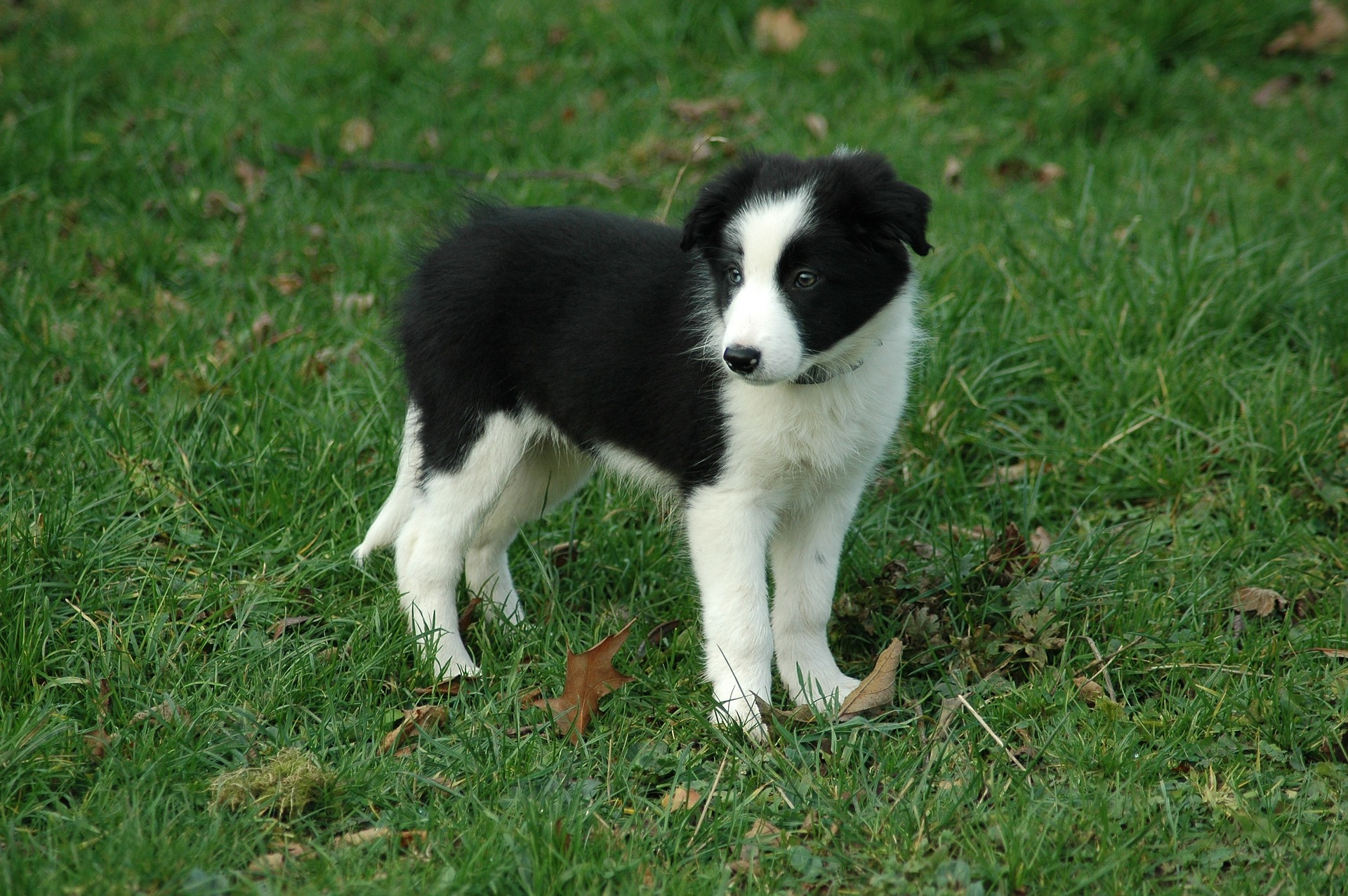
Border collies are very intelligent and eminently trainable. They take their name from the sheep farming lands which are situated on both sides of the Anglo-Scottish border © Yuppy Ermeton
Iva is undertaking the training herself with help from puppy coach Ana Odak and The Croatian Association for the Training of Guide Dogs and Mobility. Iva decided to dedicate herself personally to the task because she knows the Zagreb Children's Hospital where she works would struggle to pay for a fully trained therapy dog. Despite the time and costs involved in the necessary process, Iva has previously seen the positive effects dogs can have on her patients and knows it's a worthwhile undertaking. She is an experienced dog owner and has kept and trained several, although this is the first she has trained as a therapy dog.
Border collies are so clever that they thrive best in households that can give them lots of play and exercise. It is a British breed of dog, taking its name from the sheep farming lands which are situated on both sides of the Anglo-Scottish border. The word collie comes from the old Celtic word for useful.
All of today's purebred border collies can trace an ancestral line back to one dog. Old Hemp lived in Northumberland between 1893 and 1901 and was so skilled in his work with sheep, as well as having exactly the right temperament, that many shepherds used him as a stud for their future working dogs. Old Hemp is believed to have sired as many as 200 puppies to be reared as sheepdogs.
For the latest travel info, bookmark our main travel info article, which is updated daily.
Read the Croatian Travel Update in your language - now available in 24 languages
Croatia's Dog Beaches Mapped
July 17, 2020 - Find a beach that welcomes you and the family pet with this useful interactive map to Croatia's Dog Beaches
With domestic travel and tourism being more valued this year than in most, there's never been a better time for people in the region to hastily pack, throw the kids into the car and set off for the coast. But, what to do about the four-legged member of the family?
Luckily, Croatians are renowned dog lovers, and finding accommodation by the sea that will welcome the family pet isn't difficult. Man's best friend can also accompany you to a surprisingly large number of cafes, bars, and taverns, where the dog-loving staff will usually have gifted your pooch a bowl of water even before they've brought you your drinks. But, what to do when you go to the beach?
With lots of small children playing care-free by the shore, it's understandable that not every beach in Croatia welcomes dogs. However, many do. Now, you can find the best-known of Croatia's Dog Beaches using this useful interactive map.
Want to know where on island Pag you can bring your poodle for the pawfect paddle? Are you and your dog taking a howliday somewhere unfamiliar and not sure where to go? This map holds the answers.
While not wholly definitive (you can take your dog to almost any beach in Croatia unless it has signs saying specifically you cannot), the map has at least 65 designated dog beaches listed. Simply open it to find the one that's nearest to you.
No more worries about returning to your rented apartment to find it destroyed by the bored German Shepherd you left inside. Of course, it's possible you may still see a few fat Dalmatians on the coast, resting grumpily in the shade because they can't join in the fun, but by using this handy dog beach locator, at least now it needn't be the black and white spotted one that lives with you.

© Pixabay
City of Sisak to Pay Hefty Sum After Woman Falls Victim to Stray Dogs
The police failed to determine the owner(s) of the dogs, but the witnesses said the animals were wandering around the streets of their own accord for at least one month before the event itself. The City of Sisak will now have to pay up for the damages incurred.
As VLM/Poslovni Dnevnik writes on the 3rd of January, 2019, the City of Sisak will have to pay 43,420 kuna in compensation to Sisak woman Ljubić Rendulić-Holzer, who in September 2014 fell victim to the antics of stray dogs in the centre of Sisak, in an incident in which she fell to the ground and suffered numerous injuries to her feet and head.
The City of Sisak now has to settle a little more than 11,000 kuna in court costs on top of that, as was decided upon a few days ago by a judge at the Sisak Municipal Court, Andrea Vasiljević.
Ljubica Rendulić-Holzer, who is otherwise a judge at the County Court in Sisak herself, suffered injuries while talking to a friend in the street. Not far from her, three stray dogs without any supervision or control were playing. During whatever game the dogs were playing, they collided with her, knocking her down and causing her to hit her head and hurt her foot.
Emergency services took her to hospital where medical help was provided, after which the event was reported to the police. She continued to suffer from injuries caused by the incident at the end of March 2015, and had to go through as many as 60 physical therapy sessions.
The City of Sisak stated in its defense that the dogs cannot be determined as strays, and that if they were, damages would have to be sought via Sisak's veterinary station, which, at that time, had a contract with the City of Sisak on dealing with apparently abandoned and stray animals. However, the photograph taken by the victim's wife shortly after the attack clearly shows the scene of the event, in which three dogs of medium size without collars are involved, this was confirmed by witnesses as well.
The police could not determine the owners of the dogs from the photograph taken by the victim's husband, but witnesses claim that that same pack of dogs had been wandering around freely for about a month before the incident took place.
The court therefore ordered that the payment of damages be paid by the City of Sisak because it was determined that the city itself retains the right of supervision and control of the services provided by the Sisak veterinary station, and since the dogs had been wandering around for more than a month prior to the event, it is apparent that Sisak's city officials hadn't done their job properly. Therefore, the city budget has to pay a total of 43,240 kuna to the woman for physical ailments, psychological damage, loss of earnings, and medical treatment costs.
Otherwise, problems like this caused by dogs are quite common in Croatia and in neighbouring countries, although this was not a direct attack by dogs.
Make sure to stay up to date with our dedicated news page for more.
Click here for the original article by VLM for Poslovni Dnevnik
Croatian Mountain Rescue Service Save Abandoned Dog From Cave
The Croatian Mountain Rescue Service (HGSS) has become well known for its witty Facebook statuses over the past couple of years or so, but not everything can be looked back at with a giggle. An animal in danger is one of them.
From warning tourists and other would-be mountaineers to perhaps refrain from trying to tackle mountains in the summer sunshine with no water and wearing only flip flops, to letting those who fancy themselves as Olympic swimmers that that pretty little island over there is actually a lot further away than it looks from the mainland, the Croatian Mountain Rescue Service, made up of generous volunteers from all types of jobs and walks of life, has been making us laugh in spite of the often ridiculous and downright dangerous scenarios they continually need to rescue people from.
Of course, not all of these stories and scenarios can have a funny spin put on them, and when it comes to abandoned animals suffering and in danger at the hands of careless humans, there can be no jokes. What there can be, however, is a very happy (and lucky) ending.
As Index writes on the 29th of December, 2018, as the Croatian Mountain Rescue Service reported, during the excavation of a cave in the area of Bratiškovci (Šibenik-Knin County), members of SOS HKP "Sveti Mihovil", which included four members of HGSS Šibenik who were the leaders of this expedition, heard the distressed barking and whining of a dog coming from somwhere in the dark and unwelcoming cave.
They immediately embarked on an action to locate and rescue the injured and underweight, clearly mistreated animal. Using specialist speleological techniques, the unlucky, unwell and frightened dog was located and pulled out of the cave to safety. Given the fact that when 112 was called, not one of the competent associations bothered to even respond, the dog was taken to safety and is currently being housed at the "Sea" (More) apothecary.
The members of HGSS Šibenik, as well as members of SOS "Sveti Mihovil", once again demonstrated their bravery, humanity and superior ability and talent to deal with serious situations in potentially dangerous caves.
Make sure to stay up to date with our news and lifestyle pages for much more.
Croatian Dog Shelter Posts “No Vacancies” Sign
December 14, 2018 — On a road leading away from Zadar, bound for Vir and Pag, an unholy chorus of yelping, barks and howls echoes from a forest.
Somewhere in the woods, around 300 dogs anxiously await an uncertain fate. Their cages are full; their bowls quickly empty.
The town’s shelter faces an increasingly-common problem: dogs outnumber willing adopters.
“You know how the process goes? You find homes for five dogs, and 15 more arrive,” said the shelter’s director Davorka Šopić. “We had to stop it. We do not accept any new dogs.”
The shelter once had a fruitful working relationship with a German adoption association. Expats and German citizens supported the shelter via donations and adoptions, mainly driven by a potent social media presence.
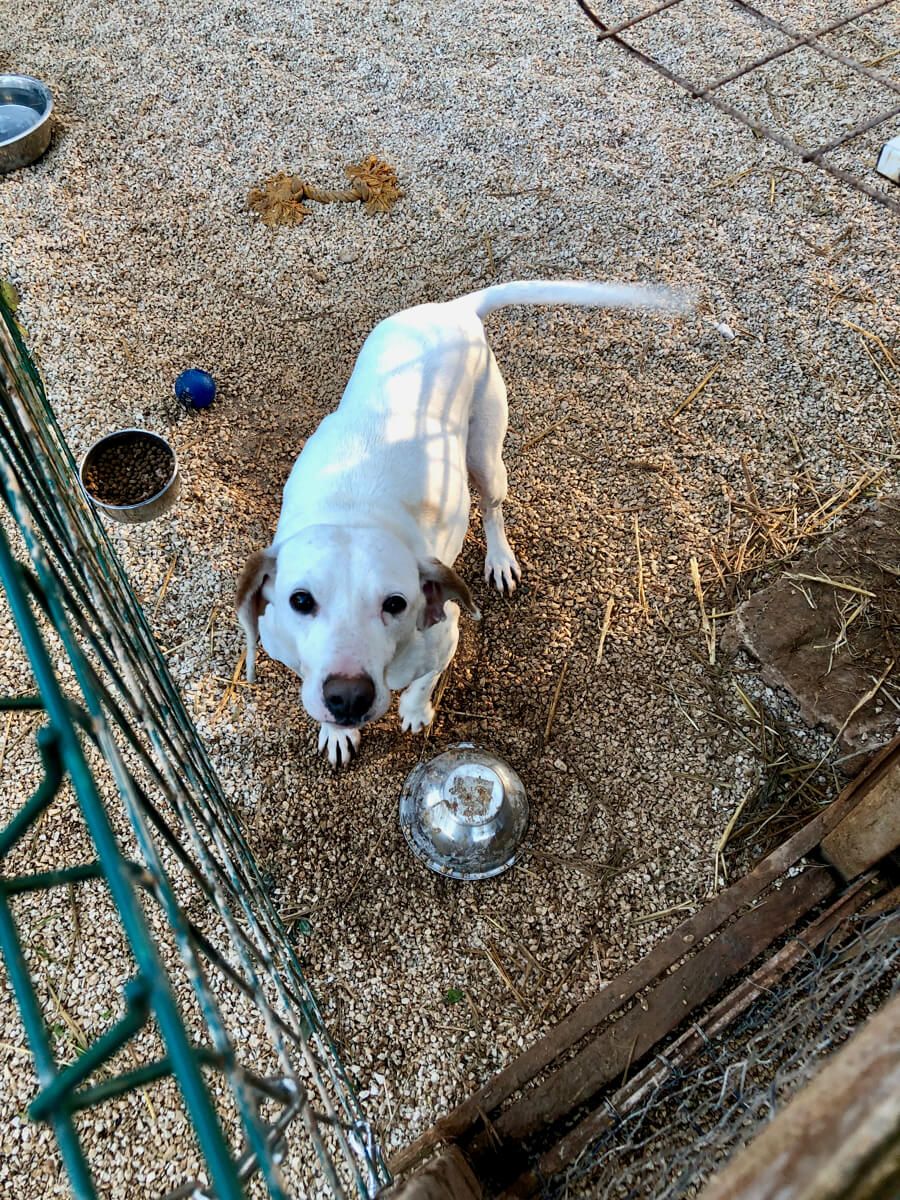
Deda, one the shelter's oldest dogs.
That connection broke for unclear reasons, according to Šopić. Since then, willing adoptees have nearly evaporated.
The only solution, she decided, was to close the shelter’s doors to new dogs. Until a new organization decides to collaborate with the shelter. Until the hundreds of dogs currently in the shelter’s makeshift pens find a home.
Zadar’s shelter is a decades-old pet project of a handful of volunteers, done in a typically-Dalmatian fashion: ignoring rules or laws. Better to seek forgiveness than ask for permission.
It emerged on an anonymous thickly-wooded plot of land along a road leading out of town.
It was never meant for inhabitants, on either two or four legs. To this day, it lacks electricity and water.
When asked who owns the property, Šopić shrugged, saying several individuals own it privately but nobody has complained in decades.
“This is nobody’s land and these are nobody’s dogs,” Šopić said.
Šopić’s days begin early, cleaning the dogs’ pens and filling their bowls, administering medicines along with her colleague Stella.
“I’d love to find a job with health coverage and benefits,” Šopić said. “Nobody can guarantee me that one of these dogs won’t bite me or something. But I’m here out of my own free will.”
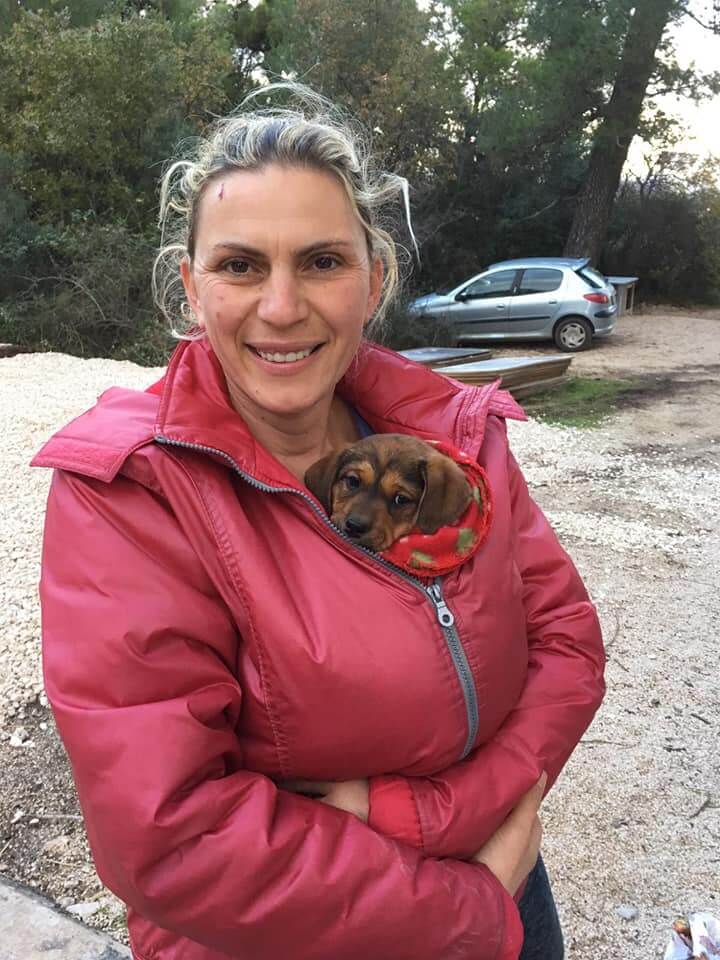
Davorka Šopić [Source: Facebook]
The two don’t work alone.
Zadar’s shelter has developed a cult status among locals with a soft spot for pooches. It has almost 10,000 followers on Facebook, and regularly posts calls to action.
The volunteers may not be able to take the dogs home, for various reasons, but they do show up in droves to help walk the pooches, clean their cages or built dog houses.
A recent windstorm, for example, lopped off branches and toppled pine trees, destroying several pens and doghouses. The ensuing weekend, volunteers showed up with chainsaws and tools to help clear the detritus and rebuild the pens.
Students also show up in groups, emptying out one pen at a time and taking the dogs for a walk as far away as nearby Paklenica National Park. Their work is commendable, but nothing beats a home.
Šopić has worked at the shelter for almost half a decade now, and admits one has to develop thick skin to be there every day. She’s effectively tuned out the chaos and depressing scenes around her.
Still, she’s not a robot. Šopić pulled out her cell phone and flipped to a photo of an emaciated American Stafford found roaming around a local garbage dump. Its ribs and spine poked out from under its skin.
“You see something like this almost every day,” she said. With no room at the shelter, the pup was on its way to Zagreb for a check-up and uncertain fate.
The shelter could always use more: donations of food, toys, over-the-counter pet medications and dog-related knick-knacks are always welcome. The shelter also has a de facto propane tank exchange program, where donors bring in full tanks and get empties.
The shelter’s future remains uncertain, but that’s been the case for almost two decades now.
“Everyone is always welcome here,” Šopić said. “We always need all sorts of help.”
Check out the Zadar shelter’s Facebook page for more information.
TCN regularly features Pets of Croatia.
Fines Await Irresponsible Pet Owners in Kastav
Fines await those who fail to pick up their animals' faeces, those who let their animals wander and/or breed without control or supervision, and those keep their dogs on chains or outdoors.


